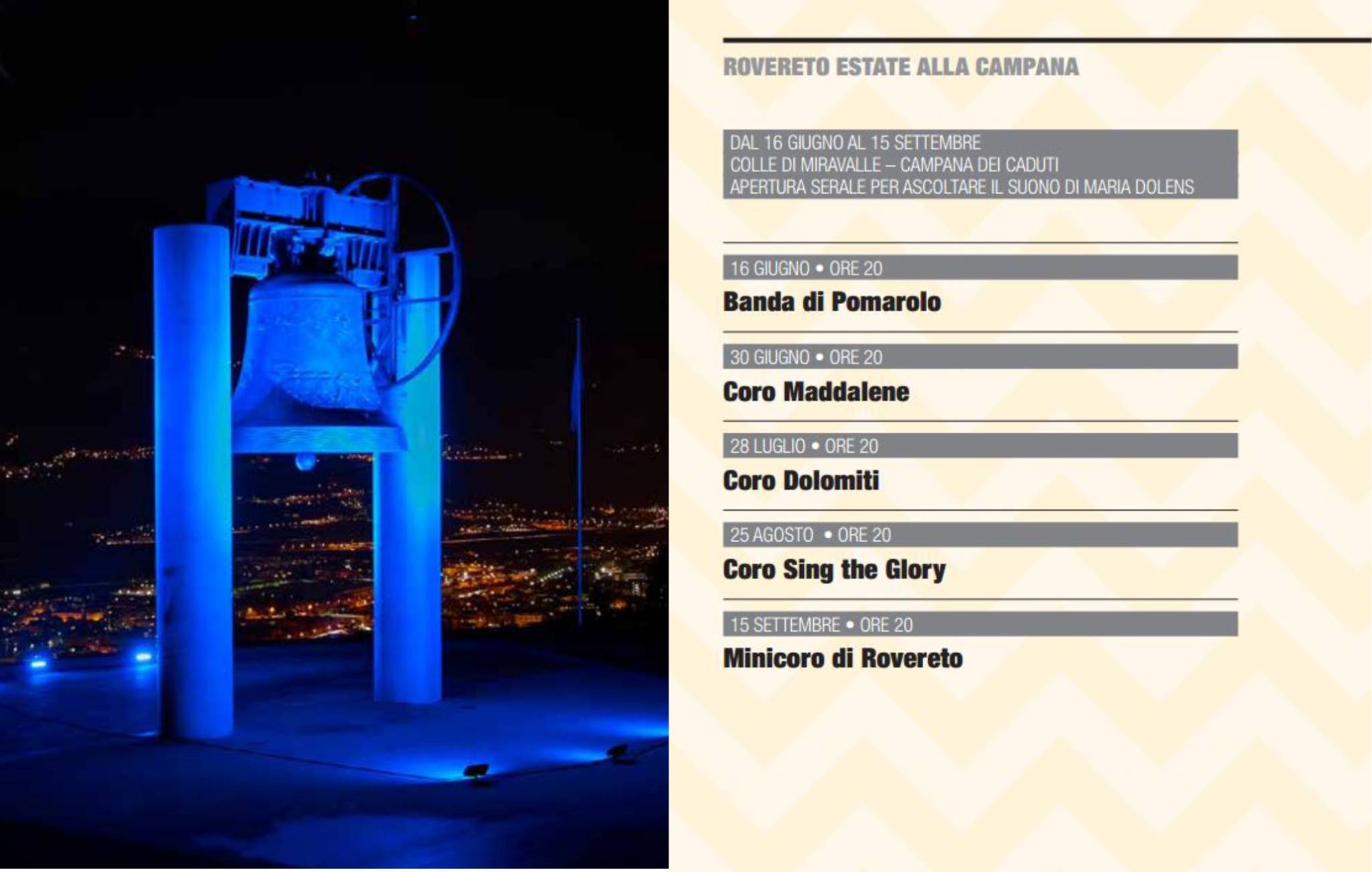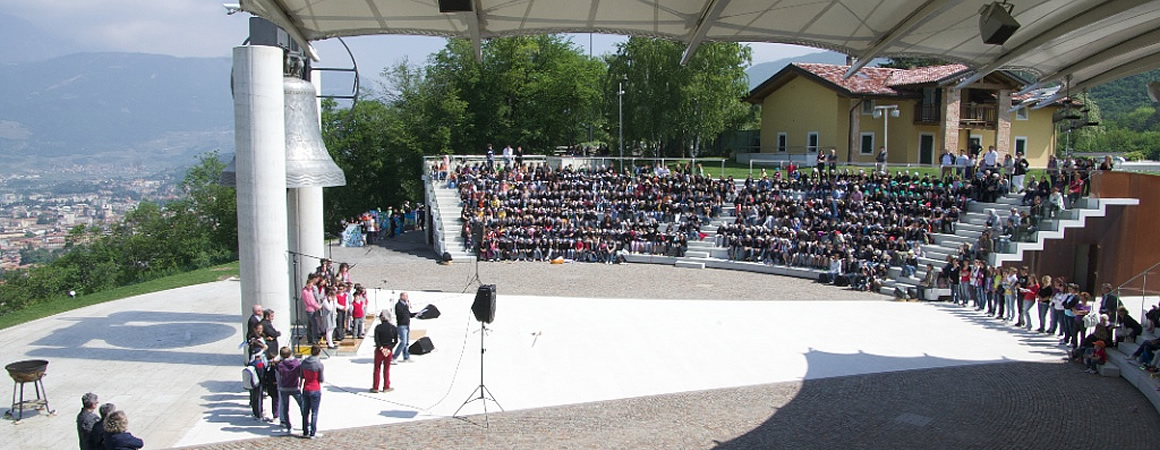From 16 June to 15 September, music events return to the Bell, with the season of evening openings.
Music, like peace, is made with others. This is why choirs and bands can be considered true workshops, both artistic and social. In Trentino in particular, these ensembles, the fruit of a long tradition of focus on music, constitute a way of conveying and passing on works from the past, as well as coming together. Workshops that create long-lasting relationships, building the social and cultural foundations necessary for peace.
This is why the Opera Campana dei Caduti Foundation has decided this year to dedicate its programme of "Fridays at the Bell" to choirs, but opening with an instrumental group, the Pomarolo Band. The group was chosen partly to pay homage to a story that dates back to New Year's Day 1887, when its first march occurred. As we know, this band plays as it walks, and since those days it has walked a lot through the streets of Pomarolo. Since its centenary year, the baton has passed into the hands of the current conductor, Stefano Matuzzi, who will open the concert on Miravalle Hill on 16 June, showcasing the results of the hard work and dedication that have made this band extraordinary, not merely for playing together, but also for its ability to create a community.
On 30 June it will be the turn of the Coro Maddalene, which will perform a programme entirely dedicated to the theme of peace, with the addition of reflections on the European values that seem particularly relevant in this period, in which individualistic impulses threaten to prevail over the needs of society as a whole. This choral concert will also remember Father Eusebio Jori, Regent of the Bell of the Fallen for 26 years, from 18 May 1953 unto his death. The priest was a native of Revò in the Non Valley, the very place of origin of the Coro Maddalene. "May our songs be transported by the wind from Rovereto's Colle Miravalle, and may their sound, alongside the solemn ringing of Maria Dolens, carry throughout the world a message of peace and dialogue, political, religious and simply human" said choir leader Michele Flaim.
Alongside the Choir there will be a performance by amateur dramatic society "La Marianela" from Romallo and young actors from the Revò middle school, directed by Giulio Visintainer.
28 July is the date of a concert by the Coro Dolomiti, with a selection of traditional songs.
The “Coro Dolomiti di Trento” was founded in 1949 by Professor Aldo Lunelli, who with great determination succeeded in gathering a group of young people passionate about choral singing. The first public performances were of traditional mountain songs, but with the passing of time, the choir acquired its own style and selected a repertoire which immediately drew the interest of critics and, above all, audiences. Over more than sixty years, the "Dolomiti" has held more than 1600 concerts in Italy and all over Europe, some of which were true landmarks in the life of the choir. Particularly worth mentioning are the concerts held in the Great Hall of the Deutsches Musem in Munich, at the Philarmonie in Berlin, the Mozarteum in Salzburg, the Burgtheater in Vienna, the Teatro Reina Victoria in San Sebastian, the performance in St Peter's Square in Rome in the presence of Pope John Paul II, at the Quirinale before the then President of the Republic Carlo Azeglio Ciampi and in Montecitorio for the "Christmas Concert". The choir has performed many times in concerts, festivals and events in Italy, Trentino and the city of Trento. They also travelled to Lima, Peru in 2005 to take part in the "1° Festival Internacional de Coros”. On that occasion, the singers visited the famous Inca settlement of Machu Picchu.
Music returns to the hill on 25 August with Sing the Glory, a concert that's also a spectacle of interlacing light, colour and bodies in movement. The concert features spiritual and gospel music, two genres that move on a shared base, but with different styles. While spirituals are songs from the 19th century sung by African-American slaves and containing references to Biblical figures as symbols of freedom and the passage to eternal life, gospel music is religious songs originating in the 1930s Protestant tradition, with a format based on a preacher calling and the faithful improvising their response. In this respect, the Sing the Glory Choir presents a show in which the audience is asked to get involved.
The season of concerts concludes on 15 September with the Minicoro di Rovereto children’s choir, regular guests at the Bell, with a concert to end the summer and begin the school year, symbolising the continuity of a commitment to work for peace which nothing can disrupt. A commitment made of passion and professionalism, just like that of the founders of the Minicoro, which since 1987 has performed in more than 500 concerts in Italy and abroad, under the guidance of conductor Gianpaolo Daicampi.
In short, once again this year the "Fridays at the Bell" season guarantees the continuance of the artistic schedule of a Foundation which for years has come up with ever-new ways of using music to convey a dynamic idea of peace, made of everyday work in the region and in international institutions such as the United Nations and the Council of Europe. Article by Marcello Filotei.

On 15 September, a concert by the Minicoro di Rovereto concludes the "Fridays at the Bell" concert season, which every year brings thousands of people to the Opera Campana dei Caduti Foundation's open-air theatre to reflect, through art and culture, on the values represented by Maria Dolens, universal symbol of concord and the hard work necessary to achieve it. Regular guests in the concerts are the Minicoro di Rovereto children's choir, which closes the season and opens the school year, thus representing the continuity of our commitment to our work for peace, which will never cease. A commitment made of passion and professionalism, just like that of the founders of the Minicoro, which since 1987 has performed in more than 500 concerts in Italy and abroad, under the guidance of conductor Gianpaolo Daicampi.
In short, once again this year the "Fridays at the Bell" season guarantees the continuance of the artistic schedule of a Foundation which for years has come up with ever-new ways of using music to convey a dynamic idea of peace, made of everyday work in the region and in international institutions such as the United Nations and the Council of Europe.
Since 16 June, when the season opened with a concert by the Pomarolo Band, the Foundation's open-air theatre has seen a succession of performers who share the spirit of union and collaboration that distinguish ensembles of passionate artists. Music, like peace, needs people who are open-minded and able to understand the needs and characteristics of those around them. This is why choirs and bands can be considered true workshops, both artistic and social. In Trentino in particular, such ensembles are the vehicle which over the decades has passed down not only entire repertoires of traditional music, but also a way of being, of collaborating and creating the cultural subsoil which is a necessary element - albeit insufficient in itself - of the quest for harmony.
Partly for this reason, on 30th June the guest performers are the Coro Maddalene, with a programme entirely focused on the theme of peace, interspersed with reflections on the Europeanist values emerging with particular relevance at a moment in history in which individualistic impulses in certain nations and certain cultural areas threaten to prevail over the needs of society as a whole. On 28 July the Coro Dolomiti performed a programme of traditional songs as an introduction for the concert on 25 August, Sing the Glory, which was also a spectacle of light and colour enveloping bodies in movement. The programme focused on spiritual and gospel music, two genres that move on common ground, and brought over a thousand people to the Hill, ready to rekindle the spiritual songs of Afro-American slaves in our contemporary reality, in which some forms of slavery are reappearing, often in the face of general indifference. The programme also included a series of gospel songs, religious hymns born in the 1930s and based on a formula where the preacher sings and elicits improvised response from the faithful. In this respect, the Sing the Glory Choir present a show in which the audience is asked to get involved.
And it is precisely this direct involvement that the Opera Campana dei Caduti Foundation asks from all who aim to work for a concept of peace which is not a generic hymn to non-violence, but manifested in concrete actions with deep symbolic value. Just as the creator of Maria Dolens and his successors have done over the past ninety years.
Article by Marcello Filotei






